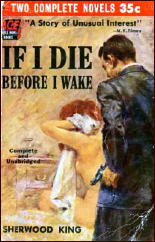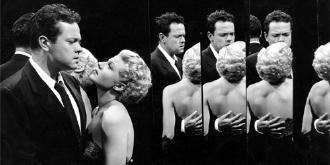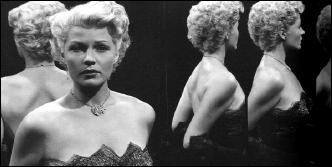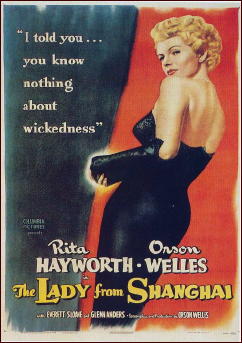Thu 30 Jan 2014
Reviewed by Dan Stumpf [Book/Film]: SHERWOOD KING – If I Die Before I Wake/The Lady from Shanghai (1947).
Posted by Steve under Crime Films , Reviews[5] Comments
SHERWOOD KING – If I Die Before I Wake. Simon & Schuster, hardcover, 1938. Mystery Novel of the Month #16, digest-sized paperback, [1940]. Ace Double D9, paperback, 1953 (published back-to-back with Decoy, by Michael Morgan). Curtis 7154, paperback, 1965.
THE LADY FROM SHANGHAI. Columbia Pictures, 1947. Rita Hayworth, Orson Welles, Everett Sloane, Glenn Anders. Based on the novel If I Die Before I Wake, by Sherwood KIng. Director: Orson Welles.

Sherwood King’s If I Die Before I Wake offers an intriguing premise: Laurence Planter is something of a footloose jack-of-some-trades marking time, as the story starts, as a chauffeur to criminal attorney Mark Bannister and his trophy wife Elsa. He also spends a lot of time running Bannister’s partner Grisby back and forth from the Bannister house to the office.
It’s on one of those runs that Grisby offers Laurence five thousand dollars to commit murder — the murder of Grisby himself.
It’s a neat book, with an even neater twist to it: Grisby wants to fake his death by having witnesses see Laurence walk to the end of a dark pier with him, hear a shot and see Laurence come back alone. But no corpse will be found — Laurence can’t (he thinks) be charged with murder, but Grisby will (he thinks) be legally dead.
And the scheme seems to work quite nicely until Laurence goes through with it and signs a confession,only to have Grisby’s body turn up after all — very very murdered.
As I say, it’s a clever hook for a story, and Cornell Woolrich could have made a nightmarish classic of it, but Sherwood King just lets it lie there with the sharp end sticking up. There’s not much action in the story and very little movement at all, as if King were too lazy to describe new locations for us. Instead,he opens the tale with awkward dialogue, then gets bogged down in a lengthy trial scene capped off with a resolution that’s all talk. And so another good idea misfires.
But wait….
The story goes that in 1946 Orson Welles was trying to raise money from Harry Cohn, the head of Columbia Pictures, and during a desperate conversation in a drugstore phone booth his eye fell upon a paperback book he’d never read and he suddenly convinced Cohn it would make a great movie, which he could direct and star in with his then-wife, Columbia’s leading lady Rita Hayworth.
Well, it’s a nice story and it may even be true, despite reports that Columbia already owned If I Die Before I Wake and was planning to have contract director William Castle make it as a B movie. (It would have made a good entry in the Whistler series.)

Whatever the case, Welles took the basic plot and most of the details and turned The Lady from Shanghai (its new title) into his most enjoyable film, a tricky, fast-moving, witty, careening ride form Central Park, through Acapulco (some of this was filmed on board Errol Flynn’s yacht) to San Francisco’s Chinatown, culminating in a visual tour-de-force: the shoot-out in a hall of mirrors where, as one critic noted, the characters have to come face-to-face with themselves before meeting their end.
Welles plays the hero like a young Falstaff, lustful, charming, and all too aware of his own fecklessness. He’s abetted by Rita Hayworth as the duplicitous wife — though he doesn’t give his then-wife much to do. I’ve seen her more effective in the hands of lesser directors — but the films is helped along splendidly by Everett Sloane and Glenn Anders as lawyers Bannister and Grisby.

Except for a part in Tarzan’s Peril, I never heard of Glenn Anders before and after this film, and he reportedly had an awful time making it, but his performance as Grisby is one of high points of the American Cinema: sweaty, smiling, whiny and worming, he seems so devoid of humanity — of perhaps so excessively human — that you can’t figure out why no one ever killed him before the picture started.
His performance complements Welles’ visual excesses perfectly, and I’ve always thought it an overlooked gem in a treasure-trove of a film.

January 31st, 2014 at 11:21 am
Apparently a new Blu Ray/DVD combination is available through TCM. I’ve been divided regarding their product but this is a fascinating film. Agree completely with all you have written but did think Rita Hayworth used effectively. Glenn Anders, through the roof.
January 31st, 2014 at 5:44 pm
That blonde hair nearly ruined Rita’s career and unfairly hurt the box office for this with audiences (remember what they did to Veronica Lake), but I agree on how entertaining this film is and Anders maybe the slimiest victim in the genre.
Even the audience wants to kill him.
I liked the book a little better, but can’t disagree with the critique of it. The story is better than the execution. Wasn’t BEFORE I WAKE first published in England?
Sadly you couldn’t trust Welles if he said the sky was blue so the story is likely just that.
Fine performance by the great Everett Sloane in this one. Of course he was an old hand dating back with Welles to the Mercury Players and radio.
Sloane played Mr. Arkadin on the Adventures of Harry Lime with Welles as Lime though Welles then played the role in the movie Mr. Arkadin based on the novel he may or may not have written based on a newspaper novelization that may or may not have been written in part by Welles. Buy the Criterion Collection Arkadin for the whole story, the book, the radio show, two or three versions of the movie, and a book on the whole confusing story. It may well be the most packed DVD I ever bought in that regard.
February 1st, 2014 at 9:15 am
David I have read MR ARKADIN a couple times and it certainly reads like one imagines Welles would have written it.
February 6th, 2014 at 3:21 pm
Dan, I agree, and you’ll note it is very much an Eric Ambler style story and Welles contributed to the direction and script as well as playing Colonel Hadji in JOURNEY INTO FEAR based on Ambler’s novel. In fact Arkadin is almost the archetype of Ambler’s ‘able criminal.’
Oddly it works better as a novel than film, the opposite of LADY FROM SHANGHAI.
Rightfully everyone concentrates on the famous funhouse climax in the mirror maze, but watch the scene where Welles character escapes from the courthouse after being convicted. It’s very much a Hitchcock scene and handled as well as the master himself. It isn’t as showy as the climax, but it shows Welles could master a scene without having to rely on spectacular camera angles and shots, relying largely on editing and familiar camera angles.
February 6th, 2014 at 3:24 pm
One other note, am I the only one who finds the plot of Arkadin remarkably close to Sheldon Reynolds FOREIGN CORRESPONDENT?
I’m not suggesting anything because they vere off in different directions, but storylines are very similar including the basic reason the hero is employed in the first place.